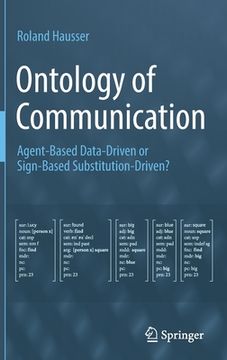Ontology of Communication: Agent-Based Data-Driven or Sign-Based Substitution-Driven? (en Inglés)
Reseña del libro "Ontology of Communication: Agent-Based Data-Driven or Sign-Based Substitution-Driven? (en Inglés)"
The book gives a comprehensive discussion of Database Semantics (DBS) as an agent-based data-driven theory of how natural language communication essentially works. In language communication, agents switch between speak mode, driven by cognition-internal content (input) resulting in cognition-external raw data (e.g. sound waves or pixels, which have no meaning or grammatical properties but can be measured by natural science), and hear mode, driven by the raw data produced by the speaker resulting in cognition-internal content.The motivation is to compare two approaches for an ontology of communication: agent-based data-driven vs. sign-based substitution-driven. Agent-based means: design of a cognitive agent with (i) an interface component for converting raw data into cognitive content (recognition) and converting cognitive content into raw data (action), (ii) an on-board, content-addressable memory (database) for the storage and content retrieval, (iii) separate treatments of the speak and the hear mode. Data-driven means: (a) mapping a cognitive content as input to the speak-mode into a language-dependent surface as output, (b) mapping a surface as input to the hear-mode into a cognitive content as output. Oppositely, sign-based means: no distinction between speak and hear mode, whereas substitution-driven means: using a single start symbol as input for generating infinitely many outputs, based on substitutions by rewrite rules.Collecting recent research of the author, this beautiful, novel and original exposition begins with an introduction to DBS, makes a linguistic detour on subject/predicate gapping and slot-filler repetition, and moves on to discuss computational pragmatics, inference and cognition, grammatical disambiguation and other related topics. The book is mostly addressed to experts working in the field of computational linguistics, as well as toenthusiasts interested in the history and early development of this subject, starting with the pre-computational foundations of theoretical computer science and symbolic logic in the 30s.

